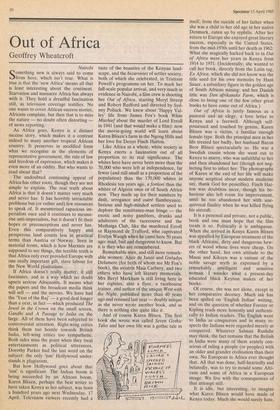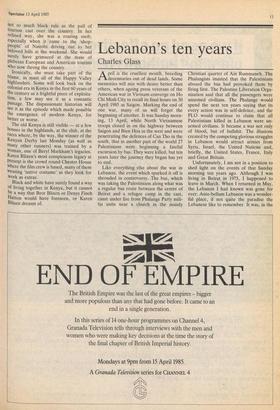Out of Africa
Geoffrey Wheatcroft
Nairobi
Something new is always said to come from here, which isn't true. What is true is that the 'new Africa' means all that is least interesting about the continent. Starvation and massacre Africa has always with it. They hold a dreadful fascination still, as television coverage testifies. No one wants to cover African success stories, Africans complain, but then that is to miss the nature — no doubt often distorting — of news reporting.
As Africa goes, Kenya is a distinct success story, which makes it a contrast indeed to many another tropical African country. It preserves in modified form what we recognise as the elements of representative government, the rule of law and freedom of expression, which makes it even more of an oddity. But who wants to read about that?
The undoubted continuing appeal of Africa has other roots, though they are not simple to explain. The real truth about Africa is that it doesn't matter very much and never has. It has horribly intractable problems but (or rather and) few resources to speak of. It mesmerised rapacious im- perialists once and it continues to mesme- rise anti-imperialists, but it doesn't fit their hopes or preconceptions and never has. Even this comparatively happy and prosperous land counts less in practical terms than Austria or Norway. Seen in material terms, which is how Marxists are supposed to see things, the terrible truth is that Africa only ever provided Europe with one really important gift, slave labour for the New World plantations.
If Africa doesn't really matter, it still
fascinates, and in a way which no doubt upsets serious Africanist§. It means what the papers and the broadcast media think will sell — and the movies. We have had the 'Year of the Raj' — a good deal longer than a year, in fact — which produced The Jewel in the Crown on the small screen, Gandhi and A Passage to India on the large. All of them have been subjected to controversial attention. Right-wing critics think them too hostile towards British India, left-wing critics too sympathetic.
Both sides miss the point when they treat entertainments as political utterances. Dorothy Parker had the last word on the subject: the only 'ism' Hollywood under- stands is plagiarism.
But how Hollywood goes about that 'ism' is significant. The Indian boom is being succeeded by an African boom. Karen Blixen, perhaps the best writer to have taken Kenya as her subject, was born a hundred years ago next Wednesday, 17 April. Television vietvers recently had a
taste of the beauties of the Kenyan land- scape, and the bizarreries of settler society, both of which she celebrated, in Tristram Powell's programme on her. To mark her full-scale popular arrival, and very much in evidence in Nairobi, a film crew is shooting her Out of Africa, starring Meryl Streep and Robert Redford and directed by Syd- ney Pollack. We knew about 'Happy Val- ley' life from James Fox's book White Mischief about the murder of Lord Erroll in 1941 (and that would make a film): now the movie-going world will learn about Karen Blixen's farm in the Ngong Hills and her love for Denys Finch Hatton.
Like Africa as a whole, white society in Kenya exerts a fascination out of all proportion to its real significance. The whites here have never been more than the 70,000 who were left at independence, far fewer (and still small as a proportion of the population) than the 170,000 whites in Rhodesia ten years ago, a fortiori than the whites of Algeria once or of South Africa now. They made up for their numbers by dash, arrogance and outré flamboyance. Serious and high-minded settlers used to deplore the remittance-man fringe — the exotic and noisy gamblers, drunks and adulterers of the racecourse and the Muthaiga Club, like the murdered Erroll or Raymond de Trafford, who captivated Evelyn Waugh when he came here 50 years ago: iad, bad and dangerous to know. But it is they who are remembered.
Remarkable men, and still more remark- able women: Alice de Janze and Gwladys Delamere (for both of whom see Mr Fox's book), the aviatrix Maia Carbery, and two others who have left literary memorials. Mrs Beryl Markham is still living here in her eighties, also a flyer, a racehourse trainer, and author of the unique West with the Night, published more than 40 years ago and reissued last year — doubly unique as she never wrote another book, and as there is nothing else quite like it.
And of course Karen Blixen. The first book she wrote was called Seven Gothic Tales and her own life was a gothic tale in itself, from the suicide of her father when she was a child to her old age in her native Denmark, eaten up by syphilis. After her teturn to Europe she enjoyed great literary success, especially in the United States, from the mid-1930s until her death in 1962. What she magically harked back to in Out of Africa were her years in Kenya from 1914 to 1931. (Incidentally, she wanted to call her book, directly from the Latin tag, Ex Africa, which she did not know was the title used for his own memoirs by Hans Sauer, a subsidiary figure in the golden age of South African mining: and her Danish title was Den afrikanske Farm, which is close to being one of the few other great books to have come out of Africa.)
Out of Africa is justly famous as a pastoral and an elegy, a love letter to Kenya and a farewell. Although self- possessed and touched by genius, Karen Blixen was a victim, a familiar enough female type. Both the principal men in her life treated her badly, her husband Baron Bror Blixen spectacularly so. He was a Swedish cousin whom she went out to Kenya to marry, who was unfaithful to her and then abandoned her (though not neg- lecting first to infect her: The photographs of Karen at the end of her life will make anyone sceptical about modern medicine say, thank God for penicillin). Finch Hat- ton was doubtless nicer, though his be- haviour also left room for improvement, , until he too abandoned her with une- quivocal finality when he was killed flying his aircraft.
It is a personal and private, not a public, book and one must hope that the film treats it so. Politically it is ambiguous. When she arrived in Kenya Karen Blixen was appalled by European treatment of the black Africans, dirty and dangerous hew- ers of wood whose lives were cheap. On the other hand, her own attitude to the Masai and Kikuyu was a variant of the noble savage myth as expressed by a remarkably intelligent and sensitive woman. I wonder what a present-day educated black Keynan makes of her books.
Of course, she was not alone, except in her comparative decency. Much ink has been spilled on 'English Indian' writing, and on the question of whether Forster or Kipling reads more honestly and authenti- cally to Indian readers. The English went to India as conquerors and in many re- spects the Indians were regarded merely as conquered. Whatever Salman Rushdie may think, the fact remains that the British in India were many of them acutely con- scious of ruling a people (or peoples) with an older and grander civilisation than their own. No European in Africa ever thought that. All that was done, half-heartedly and belatedly, was to try to mould some Afri- cans and some of Africa in a European image. We live with the consequences of that attempt still.
It is idle, but interesting, to imagine what Karen Blixen would have made of Kenya today. Much she would surely hate,
not so much black rule as the pall of tourism cast over the country. In her refined way, she was a roaring snob, especially when it came to the 'shop- people' of Nairobi driving out to her beloved hills at the weekend. She would surely have grimaced at the mass of Plebeian European and American tourists Who now throng the country.
Ironically, she must take part of the blame, as must all of the Happy Valley highlanders. Some will look back on the colonial era in Kenya in the first 60 years of the century as a frightful piece of exploita- tion, a few may see it as a romantic Passage. The dispassionate historian will see it as the episode which made possible the emergence of modern Kenya, for better or worse.
The old Kenya is still visible — at a few houses in the highlands, at the club, at the races where, by the way, the winner of the Kenyan Derby last Monday (as well as many other runners) was trained by a Woman, one of Beryl Markham's legacies. Karen Blixen's most conspicuous legacy at present is the crowd round Chester House Where the film crew is based, many of them wearing 'native costume' as they look for work as extras.
Black and white have surely found a way of living together in Kenya, but it cannot be a way that Bror Blixen or Denys Finch Hatton would have foreseen, or Karen Blixen dreamt of.















































 Previous page
Previous page